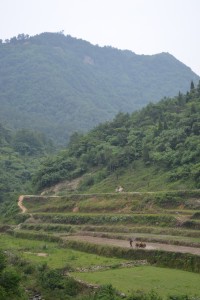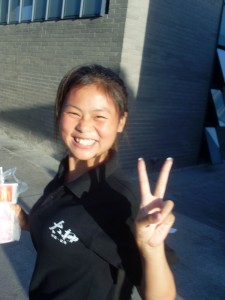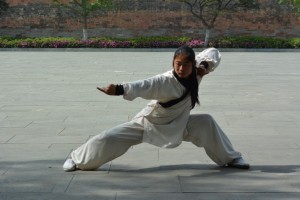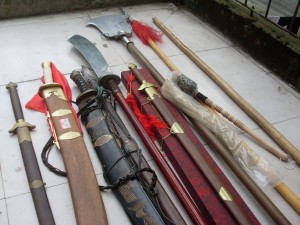Strong kids at Balanced Life Skills from Joe Van Deuren on Vimeo.
Striving
 If you have read many of my posts, you’ve maybe noticed that no matter what sort of issue I am puzzling over, I always find myself coming back to yin yang theory and balance. When I ask myself what is good or which of two things is better, I always seem to conclude that everything exists in a continuum with its opposite, and that the two are inseparable, and the healthy range of behavior or evaluation on the continuum varies very much depending on the situation.
If you have read many of my posts, you’ve maybe noticed that no matter what sort of issue I am puzzling over, I always find myself coming back to yin yang theory and balance. When I ask myself what is good or which of two things is better, I always seem to conclude that everything exists in a continuum with its opposite, and that the two are inseparable, and the healthy range of behavior or evaluation on the continuum varies very much depending on the situation.
So to continue this trend, I want to talk about striving.
Certainly in certain contexts striving seems to be critical. When you are at a kungfu school, for instance. Kungfu is exactly the outcome of long-term, continual effort. We say here at the school, “Kungfu equals time multiplied by sweat.”
But striving so often seems to mean discontent and happiness, doesn’t it? We focus on the thing we want, the thing we can’t do, the unattained goal, and the distance to that goal seems so big and we feel we’ll never reach it and it is a terrible feeling. The other day, Shifu was talking about contentedness. He pointed out that, as an organism, all a person really needs to exist is nutrients – food and water. So unhappiness that rises not from hunger or thirst is the product of the mind and the mind alone. He compared us to trees – never having a mind, they grow and flourish without worry, as tall as their environment will allow.
One of my classmates replied with a story. He said he was in Peru once and a humble cheese-maker, who spent his days in his trade but mostly on his porch surrounded by his family, asked him, “Is it true that Americans are all very busy all the time?” My classmate agreed that was true. And the cheese-maker just started laughing as if that was the silliest thing he had ever heard. All of American wealth and prosperity and industry was a big joke to this poor Peruvian who knew he had what he needed. Shifu liked that story.
I have been stumped in trying to untangle the idea of striving into its continuum and opposite, its yin and yang. But I think this is because striving is actually the name we give the intersection of two more fundamental pairings: work and rest, and agitation and calm. Striving is the name for working agitatedly. It does not have a direct opposite of its own because it exists in a complex continuum with resting calmly, resting agitatedly, and working calmly. It is hard to see the value of working or resting in an agitated way, and indeed much of my time is spent trying to free myself from habitual agitation in any mode. But remembering the model of yin and yang, I am forced to reflect that agitation too has its time and place.
Because even balance has to be balanced with imbalance – perfectly balanced forces are static, and what is life if not dynamic?
“HELLO”
 I never thought much about the word hello before I came to live in China almost 7 years ago. It was a greeting, but really not even a very natural one – I was more inclined to say “Hey,” or “Hi,” “Yo” sometimes, or even a good “Whatsup?” But China has made me conscious of many things I had previously taken for granted, and one of them is, Hello.
I never thought much about the word hello before I came to live in China almost 7 years ago. It was a greeting, but really not even a very natural one – I was more inclined to say “Hey,” or “Hi,” “Yo” sometimes, or even a good “Whatsup?” But China has made me conscious of many things I had previously taken for granted, and one of them is, Hello.
Wikipedia suggests that the word derives from old Old English, German, or French words, meaning more or less, “whoa there!” and used as an exclamation of surprise or for hailing. The usage of the word was shaped and proliferated through Thomas Edison when hello was widely adopted as a telephone greeting. Wherever the word started, I can’t imagine I’d be far wrong in guessing that it is now the most widely recognized English word in the world – there is no doubt in my mind that this is so in China, at any rate.
However, hello has gone a bit astray in transit to China from its native countries. Wikipedia lists hullo, halloo, hallo, hollo, and even hillo as variants and relatives of the word hello, and all of these and myriad others are back in circulation here as people from a thousand Chinese dialects attempt to tackle English phonetic sounds.
Further, the function of the hello in China has fragmented into several distinct usages. First and most obvious, the word is used as it is used by native speakers, as a greeting. Among people who have studied English more extensively or have been exposed more regularly to western customs, hello is a sincere and friendly acknowledgement of meeting and perhaps the initiation of a conversation in Chinese, English, or the ever-popular and practical Chinglish.
The second popular usage of the word is, rather unfortunately, in the function better reserved for “Excuse me”: that is, gracefully and politely getting the attention of a stranger or someone whose attention is otherwise engaged. For lack of fluency in English or initiation into our customs, I fear many sincere and well intentioned Chinese people make a poor first impression by seeming intrusive or forward with a loud “HELLO!” as their first overture to a westerner in the street.
The third (and to me most offensive) usage is as a metaphorical sharp stick for poking. Tall, blond-haired, blue-eyed, pale skinned westerners like myself are certainly a rarity, not to say and oddity, in China. There are an unfortunate number of people who are not content to merely witness this rarity walk by, but feel the need to provoke some reaction. The formula for accomplishing this seems to be to wait until I have walked past them several steps, and then shout “HULLOO” as loud as they can, and see what I will do. It always reminds me of an impatient child at the zoo, who wants to see the sleeping lions do something, now!
When I encounter these three hellos, I do my best to welcome the first, forgive the second, and ignore the last. But these have been 7 long years and my patience is not always what it should be, and I am sure I have ignored or snapped at more than one sincere and friendly Chinese person, and made a spectacle of myself for more than one ignorant individual I should have just ignored.
And I can say with fair certainty that my classmates have had similar experiences, because an effective (but no doubt strange-seeming, to an outsider) coping mechanism has developed among us, and yet another usage of the hello is born. Is hello used offensively or excessively? Then we will use it more offensively, more excessively. We whisper it to each other on the way to training. We shout it at one another in the halls of our dormitory. The more oddly pronounced, strangely accented, the better. Roommates bat the word back and forth like a ping pong ball, sometimes louder, sometimes softer, with every variation in cadence and emphasis. heeello. HEllo. helLO! HELLLLLLO! The word has lost meaning for us. We are inoculated against it. It is our word. It has become the word you can say when there is nothing else to be said.
So if we ever meet, you might hear me say “Hi,” or “Hey, I’m Corey,” or even “Wazzup?” But don’t think me too strange if, at some point when silence falls over the conversation, I give a little twitch of a smile and say, “halloo.”
The Wudang Swimming Hole
 It’s almost summertime weather here. Blessedly, we’re not there yet. In July and August it can get pretty unbearable – intense, humid heat that doesn’t even abate at night when you lie sweating under your mosquito net, the warm sluggish air from your fan the only thing moving, and moving more like flowing honey than wind at that. We adjust our training schedule so that we rest more in the middle of the day and train early in the morning and late after the sun goes down, but the weather is a real trial to the spirit nonetheless.
It’s almost summertime weather here. Blessedly, we’re not there yet. In July and August it can get pretty unbearable – intense, humid heat that doesn’t even abate at night when you lie sweating under your mosquito net, the warm sluggish air from your fan the only thing moving, and moving more like flowing honey than wind at that. We adjust our training schedule so that we rest more in the middle of the day and train early in the morning and late after the sun goes down, but the weather is a real trial to the spirit nonetheless.
But summer has its perks. The mountains behind the school become almost jungle-like, lush and tropical where they were dry and brown all autumn and winter. And the little river valley (in places a canyon, really) becomes a breathtakingly beautiful place to go for a walk or, when its too hot to stand it any more, a swim. On either side of the river pool where Wudang residents most often go to swim, the hills on either side rise in rocky cliffs patched with tufts of brilliant green. For the adventurer, one can climb up rocks and rapids and find several smaller pools further up the valley, and one really wonderful place where the river flows narrow and deep and dark and cold between overarching rocks and trees high overhead. It’s beautiful in a way that makes one stop and appreciate it, even if your mind was on other things.
I suppose any popular swimming spot in the world has its share of litterers – people who selfishly use a beautiful place but mar it for later visitors. That is certainly the case at the swimming hole. As the summer wears on and more and more people go to swim, the rocks and water are littered with food and drink packaging. There is no restroom easily accessible from the swimming hole, so human waste further soils the rocks on either side of the pool. All year round people take baskets of laundry to the river to wash, and so there always seems to be some soap bubbles or an odd sock floating in the eddies among the rocks. But all of that can be left behind if you make your way upriver a little ways, and serenity returns.
I am always writing about my thoughts regarding my training, but today I offer this little picture of the natural setting of my master’s school. Shifu has made it plain that as we study Daoism and try to follow nature, we are meant to be learning about and following our own natures and not to confuse the idea with a bunch of trees and rocks. But who does not feel somehow calmer and purer when surrounded by natural beauty?
Talent and Kungfu
 One of my kungfu brothers and I were talking about talent the other day. We were talking about this guy my brother had seen on a TV program, who could shoot objects out of the air with a bow and arrow as easy as breathing. Apparently this man had picked up a bow some time when he was young, and on his first shot discovered he had a knack for it. He then spent his whole life honing this skill until it was practically superhuman.
One of my kungfu brothers and I were talking about talent the other day. We were talking about this guy my brother had seen on a TV program, who could shoot objects out of the air with a bow and arrow as easy as breathing. Apparently this man had picked up a bow some time when he was young, and on his first shot discovered he had a knack for it. He then spent his whole life honing this skill until it was practically superhuman.
Here in Wudang, I’ve seen talented people come along, who, without apparent effort, are able to do things that I only wish I could do: jump higher than their own height; kick as quick and sharp as a punch; bend their bodies into astonishing contortions; dodge punches with incredible reactions, etc. There are even people who show a natural affinity for the internal, emotional practice I’ve talked about, and seem to approach the rigors and trials of life in a kungfu school with a calm placidity I envy.
But I do not think talent is really what kungfu is about. Kungfu is not about making naturally athletic and ferocious people better at beating people up or doing incredible acrobatics. It is about finding one’s weaknesses and strengthening them, and then finding the next weaknesses and strengthening those, ad infinitum. I think, from this basic tenant flows all of kungfu’s virtue. Building up where one finds weakness makes for a balanced and healthy mind and body. And the emotional ability to look at one’s own failings day in and day out without giving up on your own self worth is an incredibly powerful skill, engendering calm and poise.
It is in regard to this last quality that talent can actually be a hindrance. No matter how lucky you are, eventually you reach a point where talent can’t carry you any further, and work is required and those weaknesses have to be confronted. There have been plenty of students who get as amazing at kungfu as they can on talent, and sort of plateau, get frustrated, and leave.
Talent or no, the real fruits of kungfu are found when the talent stops and the hard work keeps going. The talented people who also apply themselves and practice, like the archer mentioned above, achieve amazing things. But there is plenty that the rest of us can glean from applying the kungfu model to the things we do in our lives.
Weapons
 Just 4 months left in my time here in Wudang. We use the word graduation to refer to September 1st of this year for lack of a better word, but in some ways it is appropriate. Like every graduation I have experienced so far, these months leading up are full of all kinds of things: trying to cram every last bit of training in to get the most possible out of the time, getting ready emotionally to say goodbye to what has been my home for the last five years, trying to imagine what the future holds after graduation and be ready for it, and also tending to all the little logistical trivialities that actually seem to make up most of life.
Just 4 months left in my time here in Wudang. We use the word graduation to refer to September 1st of this year for lack of a better word, but in some ways it is appropriate. Like every graduation I have experienced so far, these months leading up are full of all kinds of things: trying to cram every last bit of training in to get the most possible out of the time, getting ready emotionally to say goodbye to what has been my home for the last five years, trying to imagine what the future holds after graduation and be ready for it, and also tending to all the little logistical trivialities that actually seem to make up most of life.
One that looms large in my mind is the task of sorting out my belongings here in Wudang. Hopefully 80% or more can just be thrown away or given away. A lot of my training clothes fall into that category, as do the collection of tools I have assembled to serve my little craft projects. My cooking supplies will be distributed to people who will stay here and appreciate them. I have a lot of home-made pickles that I have made that need to be eaten or otherwise disposed of in the next 4 months. Some of my calligraphy and art stuff needs to come home with me, as do some of my books. I also need to acquire more training clothes while I have good access to the tailors here who make our uniforms.
All that stuff needs to be sorted, and the bits that will come home with me fit into bags and luggage, or boxes to be shipped home. And certainly the most tricky of things that I need to get home will be my training weapons. They are long and bulky and heavy, and some of them are not permitted on board trains here in China, which makes moving around the country with them tricky or expensive. So I think I will have to wrap them up as snugly as I can and put my faith in the Chinese postal service to get them to me back in the US.
Getting these practice weapons back to the US has become sort of symbolic in my mind of the whole process of leaving China, so that I can hardly pick up a sword without weighing it in my hand to think what it will cost to ship it home, and weighing it in my heart to think what it would cost to leave it behind. But there is still much to be done with them before they go in a box, so I try not to dwell on it too much until the appropriate time arrives.
